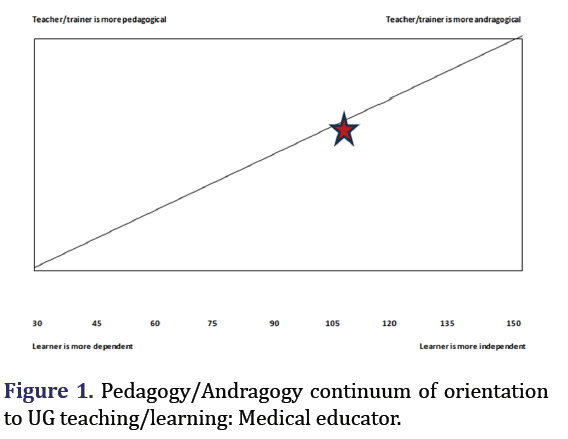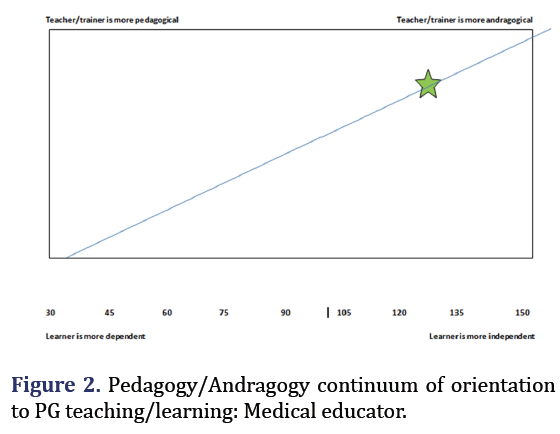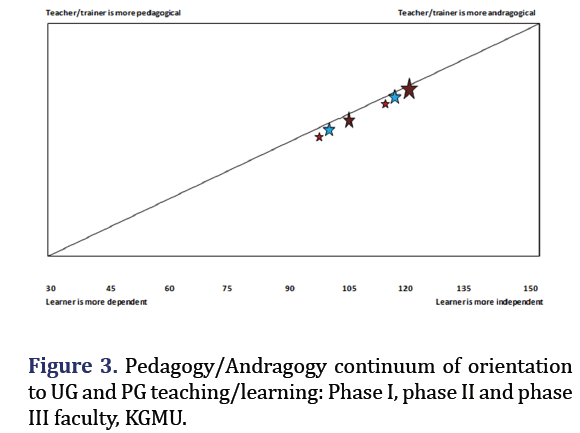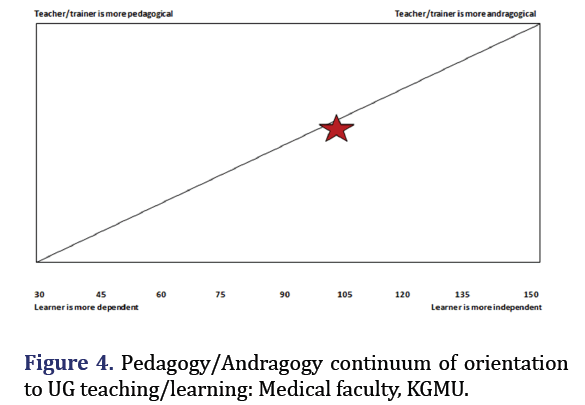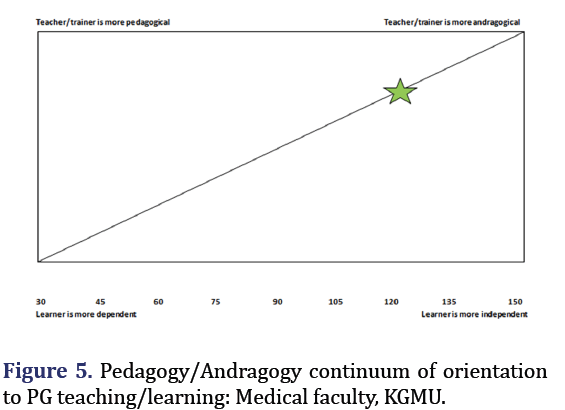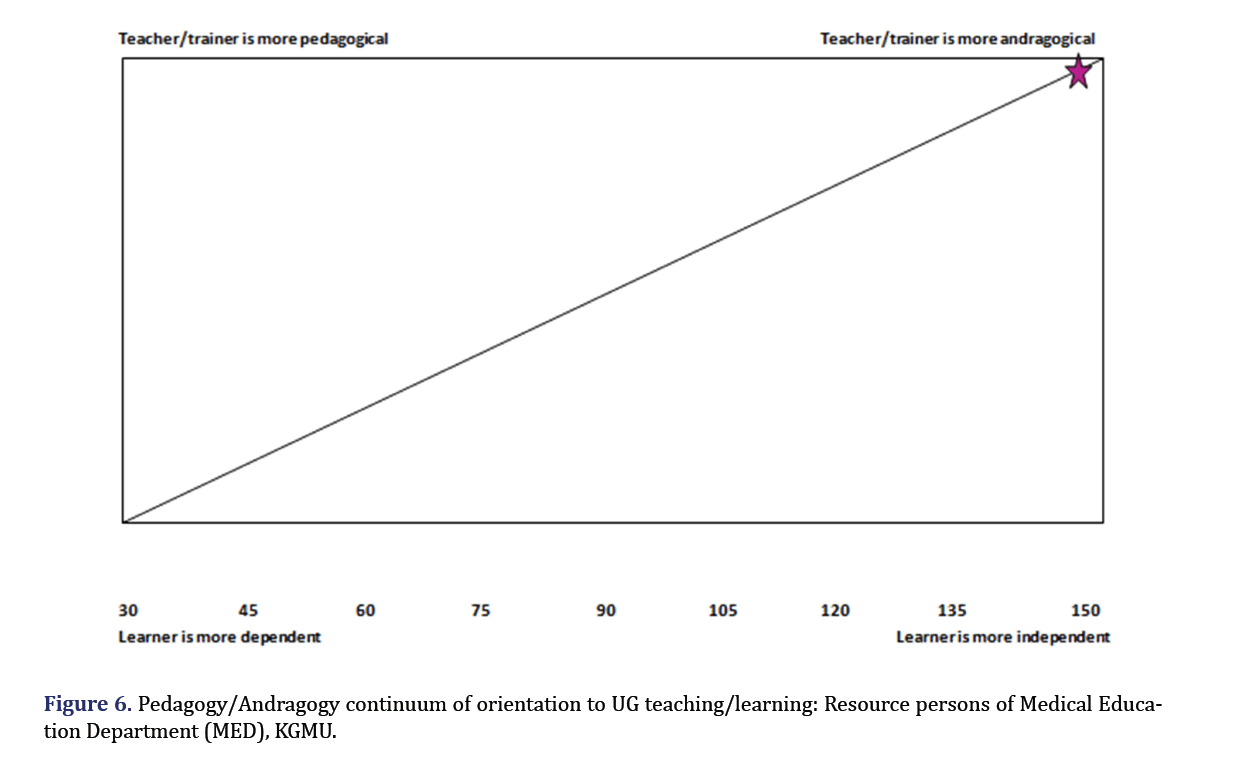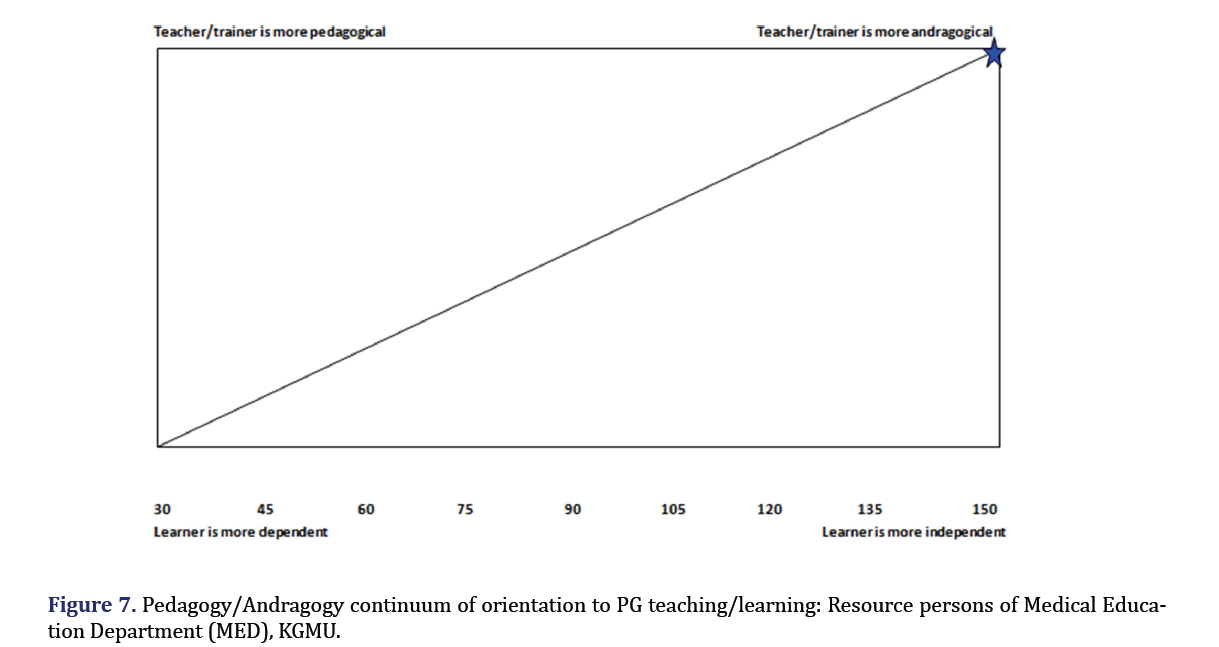Research - Journal of Contemporary Medical Education (2023)
An Insight into the Orientation to Adult Learning of Medical Facilitators/Educators: An Institutional Study
Dilutpal Sharma1*, Sandeep Bhattacharya2, Rakesh Dewan3, Shalini Bhalla4 and Mousumi Sharma52Department of Physiology, King George’s Medical University Lucknow, Uttar Pradesh, India
3Department of Anatomy, King George’s Medical University Lucknow, Uttar Pradesh, India
4Department of Pathology, King George’s Medical University Lucknow, Uttar Pradesh, India
5Department of Pathology, Rajakiya Medical College Ambedkarnagar, Uttar Pradesh, India
Dilutpal Sharma, Department of Biochemistry, King George’s Medical University Lucknow, Uttar Pradesh, India, Email: dilutpal@kgmcindia.edu
Received: 01-Sep-2023, Manuscript No. JCMEDU-23-112213 ; Editor assigned: 06-Sep-2023, Pre QC No. JCMEDU-23-112213 (PQ); Reviewed: 20-Sep-2023, QC No. JCMEDU-23-112213 ; Revised: 27-Sep-2023, Manuscript No. JCMEDU-23-112213 (R); Published: 04-Oct-2023
Abstract
Background: The term andragogy is defined as the art and science of helping adults learn. Pedagogy is the art and science of teaching children. The approach or orientation to teaching can be pedagogical or andragogical. Educators in various settings utilize the assumptions of andragogy, which are learner’s need to know self-concept of the learner, prior experience, readiness to learn, orientation to learning and motivation to learn, in their educational efforts either fully or in part.
Aim and objective: To determine and compare the orientation to adult learning of facilitators/educators of a Medical University in India in teaching of undergraduate and postgraduate students.
Materials and methods: The personal adult learning style inventory is used to assess the understanding of orientation to teaching of facilitators. The study population consists of facilitators who are both undergraduate and postgraduate teachers in the Faculty of Medical Sciences (179 in total) of the University. Psychometric analysis is performed from the data collected viathis questionnaire/inventory.
Observations and Results: Both pedagogical and andragogical orientations to teaching are found in teaching of undergraduate and postgraduate students in the facilitators of the Medical University. An increasing trend towards andragogical orientation is observed from phase I (score 99.2/150) through phase II (score 102.1/150) to phase III (score 115.5/150) in teachings of undergraduate students of the Bachelor of Medicine and Bachelor of Surgery (MBBS) course. The andragogical orientation to teaching is well observed in postgraduate teachings (score 124/150).
Conclusion: Facilitators of the university are well oriented with the principles of andragogy when it comes to facilitating postgraduate students. However, in case of undergraduate teaching, the facilitators have to adopt both the approaches, more pedagogical approach in phase I and an increasing trend towards the andragogical orientation is observed across the phases of undergraduate MBBS course in India.
Keywords
Pedagogy; Andragogy; Pedagogical approach; Andragogical orientation; Facilitators
Introduction
Adult learning is called andragogy and it is an art and science [1]. Alexander Kapp, a German educator in the year 1833 coined the term andragogy and in the 1960s, it was popularized by Malcolm Knowles [2]. Self-directed learning is the foundation of andragogy, whereas in pedagogy, it is teacher-directed learning. The words andragogy and pedagogy originated from the Greek words, "aner means adult” and “paid means child”, respectively and “agogos denotes guide or leader” [3].
Teaching and learning approaches can be pedagogically oriented or andragogically oriented [3]. The principles of andragogy, that includes need of the learner to know; learner’s self-concept; preceding experience of the learner; willingness or readiness to learn; capable of regulating their own learning; and motivation to learn that is purely internal; are utilized by many facilitators in various settings in their teaching/training efforts either fully or partially [4].
‘Content’ is the key concern of educators/facilitators with an orientation towards pedagogy. They are mainly more focused on the needs to be covered in the learning situation, how a given topic to be taught is organized into manageable units, the most rational sequence for presenting those units and the most systemic way of transmitting the knowledge in this content [3].
As opposed to, ‘process’ is the key concern of facilitators with an orientation towards andragogy, which consists of eight elements and this includes preparation of the learners, setting the learning environment, learner involvement in designing learning objectives, assisting the learners to carry out their learning plans and entailing the learners in assessing and evaluating their own learning outcomes [3].
The pedagogical and andragogical orientations are not only about the content and process that differentiates both, but also about the concern of the educator where in pedagogical orientation it is only transmitting information and skills to the learners and in andragogical orientation the concern is coming up with procedures and resources for helping learners gain information and skills [4].
Educators/facilitators must care about the true interests of learners instead of focusing on what they think are learners’ interests. With the available resources, the best educational experience is co-operative, guided instructions between the teacher and the learner. The guidance of the teacher/educator helps the learner to develop his or her own potential during these experiences [4]. Key to the success of the andragogical approach is the temperament of the teachers and their ability to understand and empathize with learners and communicate effectively with them. Caring, trust and respect for learners are equally important features for the teacher of adult learners [5].
National Medical Commission (NMC), the governing body of medical education in India, recently launched the new undergraduate Bachelor of Medicine and Bachelor of Surgery (MBBS) curriculum in 2019 and the objectives of it are to enhance knowledge and skills along with the making of a medical professional who is a clinician, communicator, professional, leader and lifelong learner and also a researcher and critical thinker [6]. To be a lifelong learner an individual must be well oriented with the concept of Self-Directed Learning (SDL). To make adjustments with the rapidly growing medical and scientific understandings of disease and health and being able to continue learning throughout the professional life course, for medical professionals lifelong learning is a necessity [7,8]. Developing lifelong learning skills allow the learner to practice active learning, diagnose his learning needs required to perform his tasks and activities during his lifetime, map out learning objectives and execute a learning plan methodically and successively [9]. The inclusion of Early Clinical Exposure (ECE) is newly incorporated in the Competency Based Medical Education (CBME), curriculum by National Medical Commission (NMC), India and this enables the learner to relate to experience of patients, thereby acting as a motivating factor to learn. SDL, experience and motivation are integral components of adult learning [6]. Although pedagogical approaches are used for teaching undergraduates, as quoted in module 8 of new CBME document, the inclusion of SDL, Small group Discussion/Teaching (SGD/SGT) and ECE is an indication by NMC to introduce the andragogical approach to teaching and learning [6].
According to Rogers (1969), providing assistance and encouragement to learn is the aim of education. He assigned the performance of the teacher to be as a facilitator or promoter of learning. To perform this role the critical element is the personal exchange between the facilitator and the learner. The building of this personal relationship depends on three attitudinal qualities of the facilitator and these are truthfulness; dispossessive, kind-hearted, appreciating, faith and high regard; and ability to truly understand and acknowledge and effectively communicate [10]. The facilitation of learning in adults yields best results by engaging the learners to participate in the design of the learning, encouraging them to be self-directed learner, more learner-centered teaching, utilizing prior experience of learners as a learning resource and making them aware of the direct relevance or utility of the learning to the learner’s circumstances [5].
Malcolm Knowles et al. [3] designed a learning instrument, “The Personal Adult Learning Style Inventory” (PALSI), to assess the orientation to teaching/learning activities of facilitators or educators. A facilitator’s orientation to adult learning along with learning methods and program administration and development can be assessed or get an insight with the help of the facilitator’s responses to this inventory [3].
Materials and Methods
This study is a comparative study and is conducted in ‘King George’s Medical University’ (KGMU), Lucknow after prior approval from the Ethical Committee of the University.
The ‘Personal Adult Learning Style Inventory’ (PALSI) is used to assess the understanding of the orientation to teaching of the facilitators [3]. The authors, ‘Malcolm S. Knowles, Elwood F. Holton III, Richard A. Swanson and Petra A. Robinson’ had permitted to use this inventory without limitation. A score between 120-150 is suggestive of a stronger orientation towards andragogy and score between 60-30 is suggestive of a stronger orientation to pedagogy.
The study population consists of faculty members who are both undergraduate and postgraduate teachers in the ‘Faculty of Medical sciences’ under ‘King George’s Medical University’ after taking their informed consents. There are 179 faculty members from ‘Faculty of Medical Sciences’ who are directly involved in teaching/training of both undergraduate and postgraduate students [11]. Out of the total 179 faculty members, the sample size is kept to 120 considering faculty members’ availability and hectic schedules. Data are collected via the questionnaire/inventory and psychometric analysis is done [12].
Results
Out of 179 faculty members/facilitators from ‘Faculty of Medical sciences’ who are directly involved in teaching/training of undergraduate and post graduate students, 130 faculty members responded to the inventory. 70/110 male and 50/69 female members responded to the inventory. The average age of the teachers who responded to the inventory is 49 years (Table 1).
| Medical faculty/ facilitators/ educators | Male in study (Age 37-64 yrs) Average age-49 yrs | Female in study (Age 37-64 yrs) Average age-49 yrs |
|---|---|---|
| Total no | 110 | 69 |
| Respond to questionnaire | 70 | 50 |
Faculty members who are resource persons in the Medical Education Unit of KGMU are excluded from the study to reduce biasness in the result.
The scores of individual faculty members who are both undergraduate and postgraduate teachers from each department are compiled and the average score is calculated for every department (Table 2 and Figure 1). The mean of the average scores of all the departments are calculated to determine the orientations of the faculty members/facilitators of KGMU (Table 3 and Figure 2). The results regarding orientations of the medical educators or facilitators, either andragogic or pedagogic are shown with a greater emphasis in a tabular form and the total score is plotted on the continuum of pedagogy or andragogy by placing a star-mark at the appropriate point (Figures 3 and 4).
| S. No. | Components of the inventory | UG (Undergraduate) | PG(Postgraduate) |
|---|---|---|---|
| I | Learning orientation | 18 | 20.8 |
| II | Learning design | 17 | 21 |
| III | Home people learn | 17 | 20.3 |
| IV | Learning methods | 18 | 20 |
| V | Program development | 20 | 22.2 |
| VI | Program administration | 17 | 20 |
| Total | 107 | 124 | |
| Components | Pedagogically oriented | Scores | Andragogically oriented |
|---|---|---|---|
| Learning orientation | 5-10 | 17 | 20-25 |
| Learning design | 5-10 | 15 | 20-25 |
| How people learn | 5-10 | 17 | 20-25 |
| Learning methods | 5-10 | 21 | 20-25 |
| Program development | 5-10 | 21 | 20-25 |
| Program administration | 5-10 | 19 | 20-25 |
| Total | 30-60 | 110 | 120-150 |
The serial numbers in the ‘Personal Adult Learning Style Inventory’ (PALSI) to which almost all the medical teachers or educators agreed to statement A in both undergraduate and postgraduate teaching/training showing a strong andragogical orientation; agreed to statement B in both undergraduate and postgraduate teaching/training showing a pedagogical orientation; and agreed to statement B in undergraduate teaching/training only showing a pedagogical orientation is shown in tabular forms (Tables 4-6).
| Components | Pedagogically oriented | Scores | Andragogically oriented |
|---|---|---|---|
| Learning orientation | 5-10 | 22 | 20-25 |
| Learning design | 5-10 | 20 | 20-25 |
| How people learn | 5-10 | 19 | 20-25 |
| Learning methods | 5-10 | 21 | 20-25 |
| Program development | 5-10 | 24 | 20-25 |
| Program administration | 5-10 | 22 | 20-25 |
| Total | 30-60 | 128 | 120-150 |
| Components of Teaching/Learning approach | Phase I faculty | Phase II faculty | Phase III faculty | |||
|---|---|---|---|---|---|---|
| UG | PG | UG | PG | UG | PG | |
| Learning orientation | 15.3 | 20.8 | 16.8 | 20.8 | 19.3 | 20.7 |
| Learning design | 14.4 | 19.3 | 16.9 | 20.7 | 18.8 | 21.2 |
| How people learn | 16.6 | 20.1 | 15.6 | 20.7 | 19.1 | 20.2 |
| Learning methods | 19.1 | 20.8 | 16.7 | 19.4 | 19 | 20 |
| Program development | 17.8 | 21 | 19.1 | 22.7 | 21 | 22.9 |
| Program administration | 16 | 20.5 | 17 | 19.7 | 18.3 | 20 |
| Overall | 99.2 | 122.5 | 102.1 | 124 | 115.5 | 125 |
| Components | Pedagogically oriented | Scores | Andragogically oriented |
|---|---|---|---|
| Learning orientation | 5-10 | 16.9 | 20-25 |
| Learning design | 5-10 | 16.4 | 20-25 |
| How people learn | 5-10 | 17.1 | 20-25 |
| Learning methods | 5-10 | 18.3 | 20-25 |
| Program development | 5-10 | 19.6 | 20-25 |
| Program administration | 5-10 | 16.4 | 20-25 |
| Total | 30-60 | 104.7 | 120-150 |
Aim and objective of the study
To determine and compare the orientation to adult learning of facilitators/faculty members of Faculty of Medical sciences of KGMU in teaching/training of undergraduate and post graduate students.
Discussion
The rapid development in the field of teaching and learning has changed adult learning and taken it to a higher level within the domain of education. To harmonize with their own anthroposphere adults have to improve their competencies. So, an educational approach becomes necessary that considers needs of adult learning. To reciprocate the needs, the andragogical approach significantly established by Malcolm Knowles is a highly acclaimed approach. Among educators and researchers in different countries andragogy has become popular, and its research body started to flourish. The andragogical approach is not limited to education only but also adopted well in other disciplines as well like medicine, criminal justice and management [13]. King George’s Medical University (KGMU), Lucknow, UP, a premier institute (No. 1 Medical College in Uttar Pradesh, India; NIRF ranking 11, NAAC A+ University) in India is also not far behind to adopt the andragogical approach to teaching and learning.
The orientation of facilitators while facilitating learning in adults is equally important. Maddalena opined that taking into consideration of the andragogical concept put forward by Knowles, it is advisable for facilitators to fit into the present century skills to achieve the goals of adult learning programme and display the concept of andragogy [14]. The outcome of the present study shows that facilitators of KGMU are well oriented with the principles of andragogy when it comes to facilitating post graduate students, with a score of 124/150 showing a strong andragogical orientation (Table 7 and Figure 5). However, in case of undergraduate teaching and learning, since the learners are in a transition phase from adolescence to adulthood, or in other words, came from a pedagogically oriented environment, hence an increasing pattern towards andragogical approach is observed across the phases of medical education in undergraduate teaching/learning among the facilitators. Learners with pedagogical orientations are to be first dealt with the pedagogical approach and then in a phase manner the andragogical approaches can be introduced so that they gradually become familiar and appreciate those [15].
| Components | Pedagogically oriented | Scores | Andragogically oriented |
|---|---|---|---|
| Learning orientation | 5-10 | 20.8 | 20-25 |
| Learning design | 5-10 | 21 | 20-25 |
| How people learn | 5-10 | 20.3 | 20-25 |
| Learning methods | 5-10 | 20 | 20-25 |
| Program development | 5-10 | 22.2 | 20-25 |
| Program administration | 5-10 | 20 | 20-25 |
| Total | 30-60 | 124.3 | 120-150 |
Professor Apjit Kaur, Head of the Department of Ophthalmology and also a resource faculty of Department of Medical Education at KGMU said, “The NMC now proposes an andragogical approach to medical Education. School education is purely pedagogical, without any exposure or sensitization to andragogy. Personally, I feel it can be challenging for the new entrants to medical education to follow this approach. They get lost in the gamut of how, from where, how much, when etc. To make the andragogical approach productive there needs to be a smooth transition from spoon feeding to independent, self-directed, continuous learning.”
The medical educators of KGMU strongly agree with the andragogical statements in the inventory shown in Table 7 in teaching/training of both undergraduate and post graduate students. The switching over from a teacher who was a content transmitter earlier to a facilitator who has now become a process manager needs to perform a different role after acquiring a different set of expertise and these include maintaining a healthy relationship with learners, assessment of the needs, involving learners in designing the learning plan, optimum use of the learning resources and motivating learners for larger participations and taking initiatives and the KGMU medical educators/teachers have very well underwent this change over from a teacher to a facilitator [16]. The best facilitation of adult learning is by encouraging learners to adopt self-directed learning. The incorporation of self-directed learning as a module in the recently launched CBME curriculum by NMC in India is a step forward for adopting the principles of andragogy in teaching/learning [6]. Knowles described SDL as a process where the initiative is taken by the learner himself and he may independently define his learning needs, formulate the learning goals, optimally use the learning resources, plan and implement his learning strategies and capable to assess and evaluate the learning outcomes [17].
Small group discussion techniques are very well implemented and applied by KGMU medical facilitators in the University [18]. Various techniques like Small Group Discussion/Teaching (SGD/SGT), tutorials, seminars, integrated teaching, role play and Problem-Based Learning (PBL) are commonly practiced by educators in KGMU in both UG and PG teaching/training which improve collaboration and cooperation between learners. Small group teaching techniques are useful and they encourage learners to be more involved with the topic and also with the co-learners. These techniques can be applied in the bedside clinics as well as in classroom settings. Key to the success of small group teaching is the role of the teacher as a facilitator of learning who takes care of the effective group working and engagement of all members in the learning process [19].
However, in case of both UG and PG teaching/training, majority of the teachers strongly favor few pedagogical statements in the inventory as shown in Table 8 thereby showing great displeasure for involving learners in planning for assessment, evaluation and financial issues (Table 8).
| Sl. No. of statement in inventory | Andragogical orientation (Statement A) | Score (1-5) | Pedagogical orientation(Statement B) |
|---|---|---|---|
| 11. | Learners should be involved in developing needs assessment instruments and procedures that provide the data for program planning | 1 to 3 | Learning/training program developers/teachers are responsible for designing and using sound needs assessment instruments and procedures to generate valid data for program planning |
| 12. | Teachers must involve their learners in defining, modifying, and applying financial policies and practices related to learning/training programs | 1 to 2 | Program administrators/teachers must be able to explain clearly to the learners their financial policies and practices related to learning/training programs |
| 28. | Learners must be involved in planning and developing evaluation instruments and procedures and in carrying out the evaluation of learning processes and outcomes | 1 to 2 | Facilitators/teachers are responsible for planning and developing evaluation instruments and procedures and for carrying out evaluation of learning processes and outcomes |
| 29. | Program developers/teachers must involve learners in designing and using learning/training program evaluation plans | 1 to 3 | Program developers/teachers are responsible for designing and implementing sound evaluation plans |
According to Henschke, as per the andragogical curriculum model of learning, evaluation of learning, should be done by “learner centered evidence validated by peers, facilitators and experts” [3]. The term evaluation is often used interchangeably with assessment in education. Kellaghan et al. 2003 was of the opinion that educational evaluation is distinct from other areas of evaluation as it has its roots in testing and assessment on one hand and curriculum and program evaluation on the other [20]. The foreword of Dr. Vinod K Pal, Chairman, Board of Governors in the Assessment Module for undergraduate Medical Education, 2019 of NMC, India quoted that the introduction of competency based curriculum necessitates structured formative assessment, periodic internal assessment and end phase summative assessment with appropriate and effective feedback built in. He further wrote that the task at hand is complex and requires extraordinary collaboration between teachers, institutions and universities [6]. Hence there is no involvement of learners in evaluation and assessment planning and so the medical educators/facilitators of KGMU also disagree with the andragogical statement in this regard.
KGMU facilitators found it difficult to involve learners in planning, working and sharing decision making with learners in case of undergraduate teaching and learning and also found it difficult to involve undergraduate students to formulate learning objectives, unlike in teaching/training of postgraduate students thereby showing a pedagogical orientation in undergraduate teaching in agreement to these statements (Table 9). This maybe because of the difference in number of students (250 students/phase in MBBS) in undergraduate course which is a large group unlike in postgraduate courses which comprise of 5 to 15 students per year, thereby a small group. Large group teaching was more pedagogical previously, but with the rapid development in medical education, new alternative models are being implemented. Pedagogic spaces are opened up with Small Group Teachings (SGT). Small group teachings are effective, amenable and can be adjusted if needed. The flexibility of SGT helps the facilitator to create awareness among the students and more interactive teaching/learning takes place. With the added advantage of getting immediate and detailed formative feedback from the facilitator and co-learners the scope to improve on their learning skills increases. The teacher is still key to this learning irrespective of all these methods. Hence the orientation changes to that of an andragogical approach rather than pedagogical and the teacher’s role changes to that of a facilitator.
| Sl. No. of statement in inventory | Andragogical orientation (Statement A) | Score (1-5) | Pedagogical orientation (Statement B) |
|---|---|---|---|
| 6. | Teacher must plan, work, and share decision making with learners | 1 to 2 | Teachers must have full responsibility and be held accountable for their plans and decision. |
| 26. | Effective learning/training engages learners in formulation of objectives that are meaningful to them. | 2 to 3 | Effective learning training requires that the facilitator/teacher clearly define the goals that learners are expected to attain. |
Promoting active learning strategies is ideal for large group teaching and that KGMU has incorporated this strategy in the time table for undergraduate students as seminars and flipped classroom thereby allowing students to experience enhanced learning of course content through small group activities, case discussions and seminar presentation.
Andragogical approaches should be acknowledged in the curriculum. This will drive the self-directed and autonomous learning in adult learners and the teacher being the facilitator [21]. The present Competency-Based Medical Education (CBME) curriculum by NMC, India encourages the andragogical approaches to teaching and learning. The inclusion of early clinical exposure, self-directed learning, small group discussion, integrated teaching and electives in the undergraduate curriculum is a step forward for taking the andragogical approach to teaching/training [6].
The concept of learning orientation is needed to be informed to the facilitators. This will help the facilitators to know about the learning orientation of the learners from an initial phase. Comparing their own learning orientations with those of the learners will allow the facilitators to set up the learning environment accordingly [3]. The Medical Education Department of KGMU is well versed with this and hence organizes workshops for faculty development on regular basis to sensitize the faculty on the different teaching/learning methods. The andragogical orientation to teaching/learning is well reflected in the scores of the inventory, 149/150 for undergraduate and 150/150 for postgraduate, respectively of the resource faculties of Medical Education Department, KGMU (Tables 10-12 and Figures 6 and 7). Professor Shally Awasthi, Head of the Department of Medical Education at KGMU said, “While we discuss the principles of andragogy, we tend to miss the most important concept of ‘metacognition’ which is an art. Adult learners must practice thinking about how they think, what and how they learn and monitor their progress”, thereby opening a new scope for study on metacognition. Applying the metacognitive approach to instruction will allow the student to be more self-directed, frame their leaning goals and monitor their progress in achieving them.
| Sl. No. of statement in inventory | Andragogical orientation (Statement A) | Score (1-5) | Pedagogical orientation (Statement B) |
|---|---|---|---|
| 2. | Effective learning/training design puts equal weight on content and process plans. | 5 | Effective learning/training design is concerned with content first and process second. |
| 3. | Effective facilitators/trainers model self-directed learning in their own behavior, both within and outside the learning session. | 5 | Effective facilitators/trainers show learners that they, the facilitators/trainers, are content experts, with the knowledge and skills to be “in the driver’s seat.’ |
| 20. | Effective learning/training design engages the learners in a responsible self-diagnosis of their learning needs. | 5 | Effective learning/training can take place only after teachers have diagnosed the real learning needs of learners. |
| 22. | Use of group dynamics principles and small group discussion techniques is critical for effective learning. | 5 | Effective learning centers on the one-to-one relationship between the facilitator/trainer and the learner. |
| Components | Pedagogically oriented | Scores | Andragogically oriented |
|---|---|---|---|
| Learning orientation | 5-10 | 25 | 20-25 |
| Learning design | 5-10 | 25 | 20-25 |
| How people learn | 5-10 | 24 | 20-25 |
| Learning methods | 5-10 | 25 | 20-25 |
| Program development | 5-10 | 25 | 20-25 |
| Program administration | 5-10 | 25 | 20-25 |
| Total | 30-60 | 149 | 120-150 |
| Components | Pedagogically oriented | Scores | Andragogically oriented |
|---|---|---|---|
| Learning orientation | 5-10 | 25 | 20-25 |
| Learning design | 5-10 | 25 | 20-25 |
| How people learn | 5-10 | 25 | 20-25 |
| Learning methods | 5-10 | 25 | 20-25 |
| Program development | 5-10 | 25 | 20-25 |
| Program administration | 5-10 | 25 | 20-25 |
| Total | 30-60 | 150 | 120-150 |
Conclusion
The orientation to adult learning of medical educators/teachers of KGMU is strongly andragogical when it comes to teaching/training of postgraduate students and the orientation to teaching/training of undergraduate students is both andragogical and pedagogical. An increasing pattern towards andragogical orientation is well observed in the medical educators/teachers of KGMU across the different phases of the MBBS course, more pedagogical in phase I and more andragogical in phase III. The new CBME curriculum by NMC India encourages an andragogical approach to teaching and learning in both undergraduate and postgraduate courses and with the efforts of the Medical Education Department of KGMU by organizing frequent in-house faculty development programs, most of the medical educators/teachers have the andragogical orientation to teaching and learning.
Acknowledgment
The authors are deeply indebted and would like to express our gratitude to the King Georges’ Medical University and its Department of Medical Education along with all the medical educators in the Faculty of Medical Sciences for supporting this study.
Conflicts of Interest
The authors declare no potential conflict of interest with respect to the research, authorship and/or publication of this article.
Compliance with Ethical Standards
This article involves participations of medical faculty members of KGMU with approval from ethical committee, KGMU (Reg. No: (ECR/262/Inst/UP/2013/RR-19)). Prior written informed consent was obtained from all participants.
Funding
The authors received no financial support for the research, authorship and/or publication of this article.
References
- Ekoto CE, Gaikwad P. The impact of andragogy on learning satisfaction of graduate students. Am J Educ Res 2015;3(11):1378-1386.
- Akintolu M, Letseka M. The andragogical value of content knowledge method: The case of an adult education programme in Kwa-Zulu natal province of South Africa. Heliyon 2021;7(9):e07929.
[Crossref] [Google Scholar] [PubMed]
- Knowles MS, Holton III EF, Swanson RA. The adult learner: The definitive classic in adult education and human resource development. Routledge 2014.
- Blondy LC. Evaluation and application of andragogical assumptions to the adult online learning environment. J Interact Online Learn 2007;6(2):116-130.
- Currie CL. Facilitating adult learning: The role of the academic librarian. Ref Libr 2001;33(69-70):219-231.
- Competency based undergraduate curriculum for the Indian medical graduate. Med Counc Ind 2018;1:1-180.
- Pai KM, Rao KR, Punja D, Kamath A. The effectiveness of Self-Directed Learning (SDL) for teaching physiology to first-year medical students. Australas Med J 2014;7(11):448.
[Crossref] [Google Scholar] [PubMed]
- Candy PC. Self-Direction for lifelong learning. A comprehensive guide to theory and practice. ERIC 1991:567.
- Knowles M. The adult learner: A neglected species. Gulf Publishing Company, 1990.
- Rogers CR. Freedom to Learn. CE Merrill Publishing Company, 1969.
- Saiyad S, Mishra SK, Rimal H, George C, Kaur G. Teaching and learning through large and small groups. J Res Med Educ Eth 2018;8:24-29.
- Oswald I. Selected readings on the learning process. By TL Harris and WE Schwahn New York: Oxford University Press, 1961. Pp. 428. J Ment Sci 1962;108(452):109.
- Swanson RA, Chermack TJ. Theory building in applied disciplines. Berrett-Koehler Publishers, 2013.
- Pratt DD. Five perspectives on teaching in adult and higher education. Krieger Publishing, 1998.
- McCauley KD, Hammer E, Hinojosa AS. An andragogical approach to teaching leadership. Manag Teach Rev 2017;2(4):312-324.
- Noor NM, Harun J, Aris B. Andragogy and pedagogy learning model preference among undergraduate students. Procedia Soc Behav Sci 2012;56:673-678.
- Meneses C, Istifo N, Lombamo G. Large group teaching. Instr Strat Health Prof Educ 2020.
- National Research Council. How people learn: Bridging research and practice. National Academies 1999.
- Boyd RD, Apps JW. Redefining the discipline of adult education. 1980.
- Badyal DK, Lata H, Sharma M, Jain A. Triple Cs of self-directed learning: Concept, conduct, and curriculum placement. CHRISMED J Health Res 2020;7(4):235-239.
- McKimm J, Morris C. Small group teaching. Br J Hosp Med 2009;70(11):654-657.
[Crossref] [Google Scholar] [PubMed]








